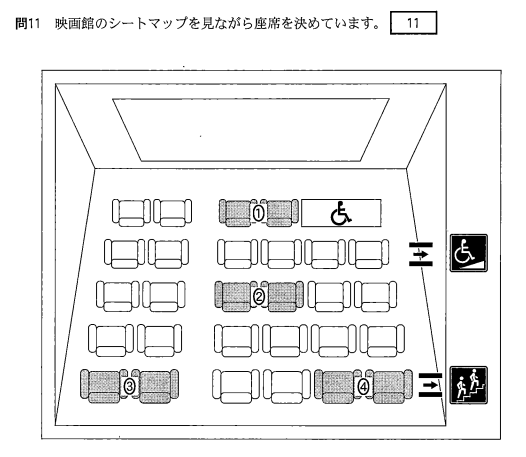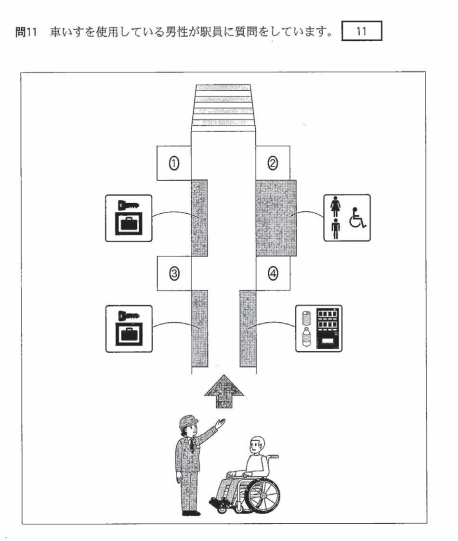これから、テーマ別にリスニング問題を解くトレーニングをしていきます。
テーマごとにリスニング問題を解いていくことができるので、効率的に各テーマの問題を解く力を鍛えることができます。
第1回のトレーニングのテーマは、前置詞です。
前置詞は、位置関係を表すために使われるので、位置関係を尋ねる問題(例えば、道案内問題など)で頻出です。
この位置関係の理解は、日常生活でも重要なため、これが関わる問題はよく出ます。
しかし、頻出なのに、苦手な人も多いです。おそらく、頭の中で位置関係がこんがらがってしまうからでしょう。
今回は、そんな前置詞を使って位置関係を表すシチュエーションに、問題をたくさん解く中で慣れていきましょう!
1)

M1: But not too near the screen, either.
W2: Isn’t the sound better at the back?
M2: Do you think so? Let’s sit there, then.
Question:
Which seats will the speakers choose?
M1:でも、スクリーンに近すぎるのもちょっとね。
W2:後ろの方が音がいいんじゃない?
M2:そう思う?じゃあ、そこに座ろうよ。
質問です。
話し手たちはどの席を選ぶのでしょう?
ポイント2:W1のセリフで、 “I’d rather not sit near the exit.” と言う発言がありました。この中の “‘d rather not” は、フルで書くと、”would rather not” です。would rather V(〔他の行動をするより〕Vしたい、prefer to Vに近い意味)という助動詞表現の否定形です。notの位置が、would rather notという風に、ratherの後ろに来るのがポイントです。よく使う表現なので、 何度も唱えて覚えておきましょう。例文:I’d rather have a quiet night in front of the TV than go out. (外出するより、テレビを見ながら静かに夜を過ごしたい。)
ディクテーション問題
空欄を穴埋めしましょう!
W1: ( ) ( ) ( ) ( ) near the exit.
M1: But not too near the screen, either.
W2: ( ) ( ) ( ) better at the back?
M2: Do you think so? Let’s sit there, then.
Question:
Which seats ( ) the speakers choose?
M1: But not too near the screen, either.
W2: (Isn’t) (the) (sound) better at the back?
M2: Do you think so? Let’s sit there, then.
Question:
Which seats (will) the speakers choose?
ポイント2:W2のセリフの穴埋めでは、 “Isn’t the sound better” という否定疑問文の形が使われていました。もともとの形は “The sound isn’t better” で、isn’tが文頭に出た形です。
ポイント3:Questionの穴埋めでは、willが答えでした。willは「ウィル」という言い方ではなく、「ウィゥ」のように発音されていました。これは、willの中の語尾の[l]の音が、 “ダークL” の発音になっていたからです。ダークLに関しては、第1部 「英語の発音徹底マスター編」3-7『ダークL』の発音の仕方を参照。
出典:共通テスト2022年度本試験 問11
2)

W1: Down there, next to the lockers across from the restrooms.
M2: Is it all the way at the end?
W2: That’s right, just before the stairs.
Question:
Where is the elevator?
W1: あそこです、トイレの向かいのロッカーの横です。
M2: 奥のほうですか?
W2: そうです、階段のすぐ手前です。
質問です。
エレベーターはどこにありますか?
例文:I’m just going down to the convenience store. (私はコンビニに行くところです。)down to the convenience storeと言っているが、コンビニは必ずしも、下ったところにあるわけではない。
ポイント2:”next to ~” は「~の隣に」という意味の前置詞。2単語という複数の語で前置詞の働きをしており、これを「群前置詞」と呼ぶ。
ディクテーション問題
空欄を穴埋めしましょう!
M1: Excuse me, ( ) the elevator?
W1: Down there, next to the lockers ( ) from the restrooms.
M2: ( ) ( ) ( ) ( ) ( ) at the end?
W2: That’s right, just before the stairs.
Question:
Where is the elevator?
W1: Down there, next to the lockers (across) from the restrooms.
M2: (Is) (it) (all) (the) (way) at the end?
W2: That’s right, just before the stairs.
Question:
Where is the elevator?
ポイント2:M2のセリフの穴埋めでは、 “Is it all the way” という語句が空欄に入りますが、Is itのところにリンキングが起こり、it allのところでは、tがフラップTになっていました。
*リンキング、フラップTともに、「第2部 ネイティブの省エネ発音徹底トレーニング」参照。リンキングは第2部の6-9でトレーニング可能。フラップTは第2部の10-13でトレーニング可能。
出典:共通テスト2021年度本試験 問11